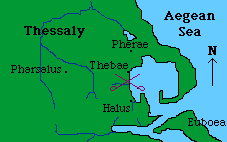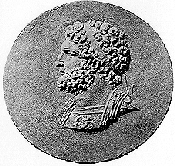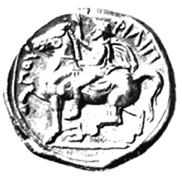Luke Ueda-Sarson's Historical Battle Scenarios for DBM:
Crocus Field: 353 BC



|
Relatively little is know about the battle. The sea lay to the east of the plain, which the supporting Athenian fleet, based at Neapolis in the north of the Aegean Sea, commanded. Philip probably force-marched at night south to the field with 3000 horse and over 20000 foot (including lots of mercenaries) to prevent Onomarchos marching north and linking up with Thessalian reinforcements from Pherae. Since the river crossing the plain is not mentioned in accounts of the battle, it is likely that the battle took place somewhat to the north - it is unlikely Philip would have chosen not to take advantage of it given the opportunity to do so. The Phokians had 500 horse and 20000 foot, mostly mercenaries, plus the supporting Athenian fleet under Chares.
|

|
The Athenians may have numbered about 2000 men, since 20 ships constituted the fleet at Neapolis the year before; in the year following the battle Athens sent 5000 men in 50 ships to aid Phayllus, the brother of Onomarchos, giving 100 men transported per ship to the same area in very nearly the same time and circumstances. While Diodorus actually says that the Athenians just happened to be passing by chance, given that they arrived so close to the time of the main clash, and had to sail into the large bay that the battlefield lies by, it is almost certain that they were actively seeking to render the Phokians assistance. However, Diodorus also says that Chares had a large number of triremes with him, and twenty in no way constitutes a large fleet by Athenian standards. Perhaps there were 50 on this occasion, as there were next year. It is likely that these were mostly mercenaries (and that they were Iphikratid "peltasts", see my Iphikrates article for these), since Athenian citizen hoplites were not routinely stationed outside Attica for extended periods of time.
At the usual scale of 250 men per element, the forces may be conjectured thusly:
The Macedonians:
1 x Reg Kn (F) C-in-C: Philip II, King of Macedon
3 x Reg Kn (F): Macedonian companions
2 x Reg LH (O): Macedonian prodromoi
8 x Reg Pk (S): Macedonian pezetairoi
32 x Reg Pk (O): Macedonian phalanx
16 x Reg Sp (I): Greek mercenary Iphicratid peltasts
2 x Reg Ps (O): Macedonian archers
2 x Irr Ps (S): Agrianian javelinmen
64 ee
1 x Reg Kn (F) Sub-general: Parmenio
5 x Reg Kn (F): Thessalians cavalry
12 x Irr Sp (O): Thessalian hoplites
8 x Reg Ps (S): Thessalian akontistai
4 x Reg Sp (O): Greek mercenary hoplites
4 x Irr Ax (O): Thracian mercenaries
4 x Irr Bg (I) [mobile baggage]
32 ee
(506 points, 96 ee)
The Phokians:
1 x Reg Sp (O) C-in-C: Onomarchos, Autokrat of Phokis
11 x Reg Sp (O): Mercenary hoplites
8 x Irr Sp (O): Phokian hoplites
14 x Irr Ps (I): Phokian javelinmen
12 x Reg Sp (I): Mercenary Iphicratid peltasts
4 x Irr Bg (I) [mobile baggage]
39 ee
1 x Reg Sp (O) C-in-C: Phayallos, brother of Onomarchos
15 x Reg Sp (O): Mercenary hoplites
12 x Reg Sp (I): Mercenary Iphicratid peltasts
6 x Reg Ps (S): Other mercenary peltasts
2 x Reg Kn (I): Mercenary cavalry
33 ee
1 x Reg Sp (I) Athenian Ally-General: Chares
4 x Reg Sp (I): Athenian marines
2 x Reg Ps (O): Athenian marines
13 x Reg Sp (I): Athenian mercenaries
20 x Reg Gal (O): Athenian trieres [Athenians]
19 ee
(520 points, 91 ee)

The Macedonians face due south, and the Phokians due north. The battlefield should have a waterway on the eastern side, edged by beach along its entire length. A road should run north to south through the central sectors, closer to the sea than the other table edge. Dice to position up to 2 pieces of brush (the side wishing the higher number gets to choose how many), each less than 500p across, in the western flank sectors.
The season is spring. Roll for attacker (Philip's Agression rating is 4) and defender (Onomarchos' Agression rating is 1) as usual to determine weather and battle start-time, but re-roll any result that requires Onomarchos to invade. The above army organisations are conjectural, so if desired, the Macedonians may organize their army freely prior to determining the weather and battle-start time, except that the Pezetairoi must be in Phillip's command. If desired, Philip may fight on foot, so transfer his command function from his 4th Kn element to one of the Pk (S) elements.
The Phokians may also organize their army freely prior to determining the weather and battle-start time, except that the Phokian hoplites must be in Onomarchos' command and the Athenians (and only Athenians) must all be in one command that is flank-marching on the waterway. The Phokians may not make any ambushes, nor have a flank-march other than the Athenians. Their Bg must be deployed on the road.
Notes and special rules:
1. The Athenians may be unreliable. This simulates the fact that the Athenians were not working in close cooperation with the Phokians, and arrived after the battle had already been lost. They may not arrive before 9 in the morning, or later than 6 in the evening.
2. DBM doesn't support the large scale usage of marines. To allow 20 elements of troops to land effectively will require a rule modifications such that a naval landing element be allowed to disembark if the naval element is in edge contact with another unladen naval element already in edge contact with the shore (vessels drawn up on a beach take up a lot less space than vessels rowing in open water). The flank march may arrive in either one or both halves of the waterway.
3.Any element of a demoralized Phokian command spontaneously flees flees towards the closest unladen naval element that it is closer than southern table edge if the path of flight does not bring the fleeing element within a base width of a Macedonian element's front edge; otherwise it flees normally to the southern table edge. As well as Athenians, trieres can embark any demoralized Phokian element, including mounted elements (who lose their mounts, becoming Sp (I) when embarked). The naval element then counts as demoralized, but need not flee unless the Athenian command is also demoralized. An trieres element may embark one demoralised element in addition to another element, such a double embarked element however moves only 100p, and fights with a -1 tactical factor. 4. The Macedonians gain an overwhelming victory if they break the Phokians without having any commands broken themselves and no more than 30 AP worth of (non-Athenian) Phokians leave the board via trieres. The Macedonians gain a marginal victory if they break the Phokians but Parmenio's command is demoralised but the army remains unbroken (the already divided Thessalians begin to regret serving Philip), or if they break the Phokians without having any commands broken themselves but more than 30 AP worth of (non-Athenian) Phokians leave the board via trieres (too many Phokians escape so the war drags on). The Phokians gain an overwhelming victory if the Macedonains are broken without the Phokians being broken, and a marginal victory if both sides break simultaneously. Any other result is a draw.

